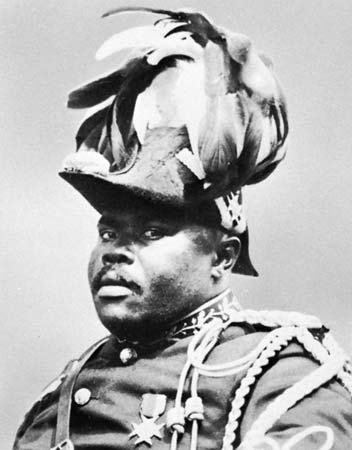The Black Star Line
"They said that the Negro had no initiative; that he was not a businessman, but a laborer; that he had not the brain to engineer a corporation, to own and run ships; that he did not know navigation; therefore, the proposition was impossible.
Oh! ye of little faith. The Eternal has happened.” Marcus Garvey, on the launching of the Black Star Line
The Black Star Line was the steamship company operated by Garvey and the Universal Negro Improvement Association from 1919 to 1922.
The Black Star Line was the U.N.I.A.'s vehicle for promoting worldwide commerce among black communities.
In Garvey's vision, Black Star Line ships would transport manufactured goods, raw materials, and produce among black businesses in North America, the Caribbean, and Africa and become the linchpin in a global black economy.
The Black Star Line was incorporated in Delaware on June 23, 1919, and was capitalized at a maximum of $500,000.
Shares were valued at five dollars each, and individuals could purchase a maximum of two hundred shares. Black Star Line stock was sold at U.N.I.A. meetings and conventions by traveling agents, mailed circulars, and through advertisements in The Negro World newspaper.
To the surprise of his critics, just three months after the incorporation of the Black Star Line, Garvey announced the purchase of its first ship. The "S. S. Yarmouth," which Garvey intended to rename the "Frederick Douglass," would set sail with an all-black crew under the command of a black captain, Joshua Cockburn.
From the beginning of the Black Star Line, Garvey faced chaos and betrayal.
The "Yarmouth" had been used as a coal boat in World War I, and was in very poor condition at the time of its sale.
The ship was reportedly worth no more than $25,000, yet the U.N.I.A. paid $165,000 for it.
Joshua Cockburn, Garvey's hand-picked captain, would later be accused of taking a kickback from the purchase price.
In 1920 Garvey spent another two hundred thousand dollars, raised from among his followers, on additional ships not worth the price.
The "S. S. Shadyside," a Hudson River excursion boat, carried black passengers on a "cruise to nowhere" on the Hudson one summer and, in the fall, sprang a leak and sank.
The steam yacht "Kanawha" (renamed the "S. S. Antonio Maceo") was grandly displayed on a Harlem pier for all Garvey's admirers to see. But on its maiden voyage, the "Kanawha" blew a boiler, killing a man.
The Black Star Line fell victim to overcharging by engineers, thievery by representatives and officers, and sabotage by the Bureau of Investigation, the predecessor to the FBI, under the direction of J. Edgar Hoover. But it was also plagued by mismanagement.
The "Yarmouth's" first commission was to transport a cargo of whiskey out of the U.S. and into Cuba before the start of Prohibition.
The ship made the trip in record time but arrived in Cuba without docking arrangements and quickly became entangled in a longshoremen's strike.
The "Yarmouth" sat stranded on the docks of Havana, waiting -- and losing money -- for weeks on end.
On another Black Star Line voyage, a cargo load of coconuts rotted at sea because Garvey insisted the ship make ceremonial visits to politically important ports.
As a business venture, the Black Star Line quickly became a disaster. Garvey's supporters invested what was, in many cases, their life's savings.
Estimates of the company's losses are as high as $1.25 million.
Yet the Black Star Line was a powerful symbol to a dispossessed people.
Thousands of Garveyites crowded the dock at 135th Street in Harlem to witness the launching of the "Yarmouth."
One spectator described the launch: "We stood on a pile of logs and watched hundreds of people jump up and down, throw up their hats and handkerchiefs and cheer while the "Yarmouth" backed from the wharf and slowly glided down the North River."
In Cuba and Central America, thousands of black supporters on horses, donkeys, and makeshift carts descended on the docks to witness the arrival of the first ship they'd ever seen owned and operated by black men.
Though it was ultimately a business fiasco, the Black Star Line was an important symbol of black potential and powerful propaganda and recruitment tool for Garvey and the U.N.I.A.
It stands as a major achievement. Facing financial ruin, Garvey announced the company's suspension shortly after his February 1922 indictment on mail fraud charges stemming from the sale of Black Star Line stock.


